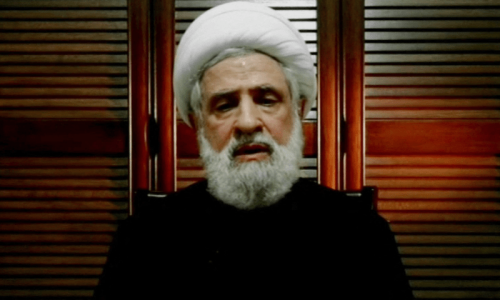
• US says ‘limited ground ops’ being carried out; Israel calls for evacuation of three Beirut neighbourhoods
• Hezbollah, Iran defiant in face of Netanyahu’s threats
• France and US oppose ground operation, Biden and Lammy seek ceasefire
BEIRUT: Lebanese troops pulled back from the border late on Monday night, as a ground invasion by Israel looked imminent, after the US said Israel is conducting limited ground operations inside Lebanon.
Hezbollah and Iran had earlier issued strong responses to Tel Aviv’s threats of a ground assault against Lebanon, with the former pledging to continue fighting, and Tehran vowing to retaliate against any ‘criminal acts’ by Israel.
In a televised address, the group’s deputy chief Naim Qassem said a new leader would be selected to replace Hassan Nasrallah “at the earliest opportunity”, and that the group was ready to face any Israeli action.
The US State Department also said Israel is “currently conducting” limited ground operations targeting Hezbollah inside Lebanon.
Late on Monday night, the Israeli military called on residents in three areas of southern Beirut to evacuate ahead of a likely strike on alleged Hezbollah targets in the group’s stronghold.
Lebanon’s state-run National News Agency reported “continued artillery shelling” on Wazzani and the nearby Marjayoun plain and Khiam “for more than two hours”.
Meanwhile, Iranian Foreign Ministry spokesperson Nasser Kanaani said Iran will not leave any of “the criminal acts” of Israel unanswered, referring to the killing of Hezbollah’s chief and an Iranian Guard deputy commander in Lebanon.
Brigadier General Abbas Nilforoushan was killed in Israeli strikes on Beirut on Friday, which also claimed the lives of Nasrallah and other senior Hezbollah figures.
Israel’s intensified attacks against Hezbollah in Lebanon and Houthis in Yemen have prompted fears that Middle East fighting could spin out of control and draw in Iran and the United States, Israel’s main ally.
“We stand strongly and we will act in a way that is regretful [for the enemy],” Kanaani told a weekly news conference, adding that Iran does not seek war but is not afraid of it.
‘No part of Mideast out of Israel’s reach’
Israeli PM Benjamin Netanyahu issued a fresh warning to Iran on Monday, saying there was no place in the Middle East beyond Israel’s reach amid a flurry of strikes against Hezbollah in Lebanon.
Addressing the people of Iran, Netanyahu warned that their government was bringing them “closer to the abyss”. “With every passing moment, the regime is bringing you — the noble Persian people — closer to the abyss,” said Netanyahu.
“There is nowhere in the Middle East Israel cannot reach,” the prime minister added, warning the people of Iran that their “regime plunges our region deeper into darkness and deeper into war”.
Netanyahu’s comments came hours after Iran’s foreign ministry spokesman said the country had no plans to send its fighters to directly confront Israel.
“There is no need to send extra or volunteer forces of the Islamic Republic of Iran,” said Kanaani, adding that Lebanon and fighters in the Palestinian territories “have the capability and strength to defend themselves against the aggression”.
Call for de-escalation
World leaders, meanwhile, have called for a de-escalation. French Foreign Minister Jean-Noel Barrot met the Lebanese premier in Beirut on Monday, and said his government sought “an immediate halt” in the strikes.
Barrot again urged Israel not to undertake any ground invasion of Lebanon, adding France will step up its support for the Lebanese army. “I (…) urge Israel to refrain from any ground incursion and to cease fire.
I call on Hezbollah to do the same and to refrain from any action likely to lead to regional destabilisation,“ Barrot told reporters.
He is the first high-level foreign diplomat to visit since the Israeli strikes intensified.
A US official told Reuters on Monday the positioning of Israeli troops suggested a ground incursion could be imminent.
But US President Joe Biden indicated he was opposed to Israeli ground operations in Lebanon and called for a ceasefire.
“I’m more aware than you might know and I’m comfortable with them stopping. We should have a ceasefire now,” Biden told reporters when he was asked if he was aware of reports of Israeli plans for a limited operation, and if he was comfortable with one going ahead.
British foreign minister David Lammy also repeated calls for an immediate ceasefire amid reports of a potential escalation in the Israel-Lebanon conflict, after discussing the matter with US Secretary of State Antony Blinken over the phone on Monday.
Published in Dawn, October 1st, 2024













































Dear visitor, the comments section is undergoing an overhaul and will return soon.